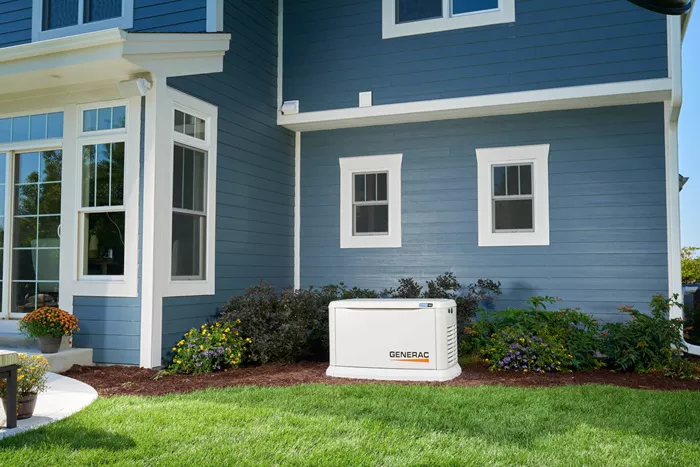Investing in a whole house generator can offer peace of mind during power outages, ensuring your home’s essential systems remain operational. But before making such an investment, it’s crucial to understand the associated costs. This article provides a comprehensive breakdown of the costs involved in purchasing and installing a whole house generator.
Initial Purchase Cost
Types of Whole House Generators
Whole house generators come in various types, each with different costs. The main types include:
Standby Generators: These are permanently installed and automatically start when the power goes out. They range from $3,000 to $10,000 or more, depending on the size and features.
Portable Generators: These are less expensive, costing between $500 and $2,000. However, they require manual setup and connection.
Inverter Generators: Known for their efficiency and quiet operation, inverter generators range from $1,000 to $4,000.
Brand and Model
The brand and model significantly affect the cost. Leading brands like Generac, Kohler, and Cummins offer reliable and durable generators but come at a premium price. For instance:
Generac Generators: Typically range from $2,000 to $5,000.
Kohler Generators: Can cost between $3,000 and $6,000.
Cummins Generators: Usually priced from $3,500 to $7,500.
Installation Costs
Professional Installation
Hiring a professional for installation is essential for safety and efficiency. Installation costs vary based on several factors:
Electrical Work: Involves wiring the generator to your home’s electrical system, costing between $500 and $2,000.
Plumbing Work: Necessary for connecting the generator to the fuel source (natural gas or propane), ranging from $300 to $1,500.
Permits and Inspections: Required in many areas, costing between $100 and $500.
Site Preparation
Preparing your site for generator installation may include:
Concrete Pad: Essential for mounting the generator, costing between $300 and $500.
Landscaping Adjustments: If the installation site requires clearing or leveling, costs can range from $200 to $1,000.
Fuel Costs
Fuel Type
The cost of running a whole house generator depends on the fuel type:
Natural Gas: Generally costs between $5 and $10 per hour of operation.
Propane: Typically ranges from $15 to $30 per hour.
Diesel: Costs around $10 to $20 per hour.
Fuel Consumption
Fuel consumption varies based on the generator’s size and load:
Small Generators (7-10 kW): Consume around 1.5 to 2.5 gallons of propane per hour or 100-150 cubic feet of natural gas per hour.
Medium Generators (11-20 kW): Use approximately 2.5 to 4 gallons of propane per hour or 150-250 cubic feet of natural gas per hour.
Large Generators (21-45 kW): Consume about 4 to 8 gallons of propane per hour or 250-450 cubic feet of natural gas per hour.
Maintenance Costs
Regular Maintenance
Maintaining your whole house generator is crucial for longevity and reliability:
Oil Changes: Recommended every 100-200 hours of operation, costing between $50 and $150.
Filter Replacements: Air and fuel filters should be replaced annually, costing around $50 to $100.
Battery Replacement: Typically required every 2-3 years, costing between $100 and $200.
Annual Service Contract
Many homeowners opt for an annual service contract, which covers regular maintenance and inspections. These contracts usually cost between $200 and $500 per year.
Additional Costs
Transfer Switch
A transfer switch is essential for safely switching power from the grid to the generator:
Manual Transfer Switch: Costs between $200 and $600.
Automatic Transfer Switch: More convenient but pricier, ranging from $500 to $1,500.
Upgrades and Accessories
Optional upgrades and accessories can enhance your generator’s performance and convenience:
Remote Monitoring Systems: Allow you to monitor your generator remotely, costing between $100 and $500.
Weatherproof Enclosures: Protect your generator from the elements, ranging from $200 to $800.
Noise Reduction Kits: Help reduce the generator’s noise, costing between $50 and $300.
see also: 4 Best Whole House Inverter Generator
Total Cost Estimate
Example Scenario
To provide a clearer picture, let’s consider an example scenario for a mid-sized home requiring a 20 kW standby generator:
Generator: $4,000 (Generac 20 kW model)
Professional Installation: $2,500 (including electrical and plumbing work)
Site Preparation: $500 (concrete pad)
Permits and Inspections: $200
Fuel Costs (annual): $1,000 (natural gas, assuming 100 hours of operation)
Maintenance (annual): $300 (service contract)
Total Estimate
In this scenario, the initial cost would be around $7,200, with an annual operating cost of approximately $1,300. Keep in mind that actual costs may vary based on your specific situation and location.
Conclusion
Understanding the costs associated with a whole house generator involves considering the initial purchase price, installation expenses, fuel costs, and ongoing maintenance. By carefully evaluating these factors, you can make an informed decision that ensures your home remains powered during outages.
FAQs:
How long do whole house generators last?
Whole house generators typically last between 10 to 30 years, depending on the brand, model, and maintenance practices.
How often should you service your whole house generator?
It is recommended to service your whole house generator annually or after every 100-200 hours of operation.
Can you install a whole house generator yourself?
While possible, it is not recommended to install a whole house generator yourself due to the complexity and safety concerns involved. Hiring a professional ensures proper installation and compliance with local codes.
What size generator do you need for your house?
The size of the generator you need depends on your home’s power requirements. A professional can help you determine the appropriate size based on the essential systems you want to keep running during an outage.
Do whole house generators increase home value?
Yes, whole house generators can increase home value by providing a reliable power source during outages, which is a desirable feature for many homebuyers.
Related topics:
- 3 Best Dual Fuel Whole Home Generators
- TOP 4 Whole Home Solar Generators
- 4 Best Natural Gas Whole Home Generator

